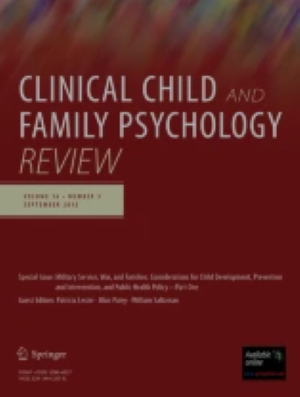系统回顾与元综合:父母有精神疾病的儿童、青少年和年轻人的应对策略。
IF 6.1
1区 心理学
Q1 PSYCHOLOGY, CLINICAL
引用次数: 0
摘要
目的:研究和整合目前关于儿童、青少年和父母患有精神疾病的年轻人所采用的应对策略的定性文献。我们于2023年11月在APA PsycInfo、PubMed、Web of Science、CINAHL Ultimate和Psychology and Behavioral Science Collection数据库中进行了系统的文献检索。采用定性或混合方法设计的同行评议研究符合纳入条件。经质量评价,共纳入14篇文献。这些研究在定性研究综合的基础上进行了分析,报告的应对实例被提取出来,并被斯金纳及其同事(Skinner et al., Psychological Bulletin, 129:216-269, 2003)概念化为应对的高阶家庭。父母患有精神疾病的儿童、青少年和年轻人主要使用寻求支持和住宿作为应对策略。紧随其后的是逃避、孤立和自力更生等策略。一个重要的发现是角色转换作为一种应对策略的重要性,这与现有的高阶应对家庭体系不相适应。在规范样本中建立的应对分类类别需要修改,以更好地反映患有精神疾病的父母的后代的具体经历。因此,在以往模型的基础上,结合本综述的研究结果,提出了一个新的COPMI(父母患有精神疾病的孩子)应对模型。本文章由计算机程序翻译,如有差异,请以英文原文为准。
Systematic Review and Meta-Synthesis: Coping Strategies of Children, Adolescents, and Young Adults of Parents with a Mental Illness.
To examine and integrate the current state of knowledge regarding qualitative literature on the coping strategies employed by children, adolescents, and young adults of parents with a mental illness. A systematic literature search was conducted in November 2023 in the following databases: APA PsycInfo, PubMed, Web of Science, CINAHL Ultimate, and Psychology and Behavioral Science Collection. Peer-reviewed studies utilizing a qualitative or mixed-method design were eligible for inclusion. After quality assessment, a total of 14 articles were included. These studies were analyzed following a qualitative research synthesis, and the reported coping instances were extracted and classified into higher-order families of coping, as conceptualized by Skinner and colleagues (Skinner et al., Psychological Bulletin 129:216-269, 2003). Children, adolescents, and young adults of parents with a mental illness predominantly used support seeking and accommodation as coping strategies. This was followed by strategies such as escape, isolation, and self-reliance. A significant finding was the prominence of role reversal as a coping strategy, which did not fit into the existing system of higher-order families of coping. The established categories for classifying coping in normative samples require modification to better reflect the specific experiences of offspring of parents with a mental illness. Consequently, a new model of coping of COPMI (children of parents with a mental illness) is proposed, building on previous models and integrating findings from this review.
求助全文
通过发布文献求助,成功后即可免费获取论文全文。
去求助
来源期刊

Clinical Child and Family Psychology Review
PSYCHOLOGY, CLINICAL-
CiteScore
10.50
自引率
4.30%
发文量
45
期刊介绍:
Editors-in-Chief: Dr. Ronald J. Prinz, University of South Carolina and Dr. Thomas H. Ollendick, Virginia Polytechnic Institute Clinical Child and Family Psychology Review is a quarterly, peer-reviewed journal that provides an international, interdisciplinary forum in which important and new developments in this field are identified and in-depth reviews on current thought and practices are published. The Journal publishes original research reviews, conceptual and theoretical papers, and related work in the broad area of the behavioral sciences that pertains to infants, children, adolescents, and families. Contributions originate from a wide array of disciplines including, but not limited to, psychology (e.g., clinical, community, developmental, family, school), medicine (e.g., family practice, pediatrics, psychiatry), public health, social work, and education. Topical content includes science and application and covers facets of etiology, assessment, description, treatment and intervention, prevention, methodology, and public policy. Submissions are by invitation only and undergo peer review. The Editors, in consultation with the Editorial Board, invite highly qualified experts to contribute original papers on topics of timely interest and significance.
 求助内容:
求助内容: 应助结果提醒方式:
应助结果提醒方式:


